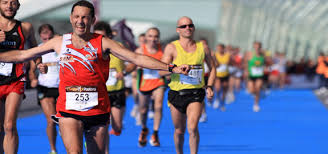|
With the Toronto ScotiaBank Marathon approaching this Sunday (of which I will be running) many people are scrambling last minute to figure out a nutritional plan (At least that’s my impression because many people seem to flood my inbox with questions). I’m sorry to say this, but it may too late and not worth doing at this point. There are multiple reasons why, so let’s take a look. First off, let’s take a look at what carbohydrate loading actually is. Carbohydrate/ Carb loading is a method to manipulate and increase your muscle glycogen stores to provide you with additional energy to complete an endurance-sporting event. The problem is that most people resort to a large pasta dinner the night before the race, likely for the first time ever. The problem is that this ineffective and if you’re trying this for the first time can lead to race day disaster (Never try anything new for races – You’ll never know how your body will respond for the first time). The other problem is that one large plate of pasta simply isn’t enough carbohydrate to be effective. Carb loading is an extremely complicated thing to do. There are multiple stages of a carb load, multiple recommendations in terms of grams of carbohydrate per hour, total carbohydrates consumed and even the type of carbohydrate will make a huge difference. There are multiple phases of an effective carbohydrate loading plan, a moderate loading phase and big loading phase. At this point aside from providing grams of carbohydrates to be consumed within 5-hour blocks to provide constant supplies of carbohydrates, training needs to be reduced. For many people reduction in training simply isn’t an option, luckily there are other methods to effectively carbohydrate load the day before an event for an athlete that refuses to stop training! Additionally, you may not know how your body responds to carb loading because you'll be heavier, the additional glycogen in your muscles also attracts water to the muscles. Often times runners can complain of feeling too stiff after a carb load because their muscles are swollen, which is another reason why you should not do this for the first time before a race! Unfortunately for many of you reading this, that means that this year’s marathon may not have the nutritional plan to fuel the best race of your life, but the good news is you now can begin to understand how complicated carbohydrate loading is. It’s definitely more complicated than a large pasta dinner the night before. So if you’re planning on running the marathon next year then this might be a good sign to work with a Sports Dietitian to establish a nutrition plan for the marathon. But in the meantime, here are some general rules of thumb when eating the few days before a marathon that can actually help you run better then that large pasta dinner:
 Hopefully this shines some light on how complicated carb loading actually is and gives you some helpful information. There are many complicated things to consider, so trying it for the first time before a big run is definitely not recommended. If this is your first marathon, don’t change anything to your plan. This will better ensure that you finish with fewer complications and if there are complications they shouldn’t be new issues, they should be predictable and therefore manageable. If you want to have the best run of your life then it would be worthwhile to work with a Sports Dietitian early on in your training in order to ensure the best race of your life! Good luck to everyone this Sunday! Like I said, I’ll be running the Marathon as well, so if you see Spiderman running alongside you, say hi, because that’s what I’ll be wearing! Benjamin Sit, RD, Sports Dietitian, PTS President of Evolved Sport and Nutrition Complete Lifestyle Management
2 Comments
26/12/2019 06:24:36 am
The diet plan which is provided by you seems extremely beneficial for losing weight and gaining enough energy to do any kind of work of the world. I must adapt your plan so as to get betterment in my own health.
Reply
18/10/2021 07:17:09 am
Wir haben eine riesige Sammlung der besten 5d diamond painting. Sie können leicht navigieren und durchsuchen unsere Sammlung von den unten stehenden Symbolen.
Reply
Leave a Reply. |
Categories
All
Archives
November 2021
|
- Home/ News
- About
- Services/ Store
- Media
-
Learning Center
- ESN Athletic and Healthy Lifestyle Learning Center >
-
Professional Learning Center
>
-
The ESN Sports Nutrition Certificate
>
- ESN Learning Center - Sports Nutrition Certificate Level 1 >
- ESN Learning Center Sports Nutrition Certificate Level 2 >
-
ESN Learning Center - Sports Nutrition Certificate Level 3
>
- Module 1 - Periodization for the Athlete
- Module 2 - Nutrition Strategies to Optimize Recovery
- Module 3 - Sports Nutrition for Children and Young Athletes
- Module 4 - Sports Nutrition for the Aging Athlete
- Module 5 - Nutritional Strategies for Injury Prevention and Concussions
- Module 6 - Nutritional Strategies for the Travelling Athlete
- Module 7 - Tournament Nutrition Strategies
-
The ESN Sports Nutrition Certificate
>
- Contact
Proudly powered by Weebly



 RSS Feed
RSS Feed